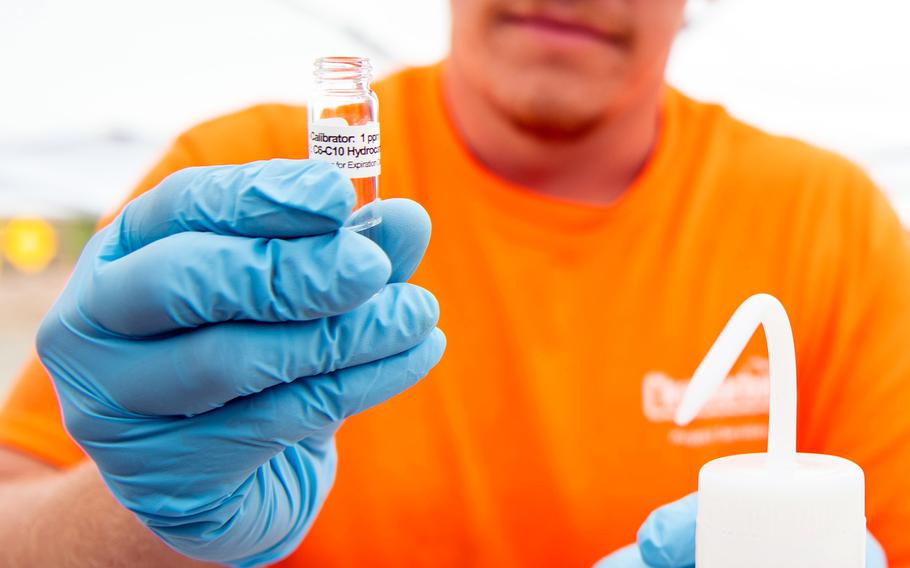
A Navy contractor tests a water sample from the Red Hill well in Honolulu in April 2022. (Mar’Queon A. D. Tramble/U.S. Navy)
FORT SHAFTER, Hawaii — Another 2,200 individuals filed suit in federal court Monday seeking compensation for illnesses, distress and financial hardship they say stem from exposure to petroleum-tainted Navy tap water in Hawaii.
The complaint was filed in U.S. District Court for Hawaii by Just Well Law in Austin, Texas, and Honolulu-based Hosoda Law Group on behalf of 2,212 plaintiffs. They allege the Navy was negligent and failed to properly address medical concerns in the wake of jet fuel contamination in the Navy’s water distribution system at Joint Base Pearl Harbor-Hickam.
The contamination was traced to a spill from the Red Hill Bulk Fuel Storage Facility a few miles from the joint base. The World War II-era facility is being emptied and permanently closed.
This lawsuit joins a similar one filed in 2022 by the same attorneys on behalf of 296 residents and former residents of the affected communities who are also seeking compensation.
The first suit is set for trial in April and too far along to add new litigants, Kristina Baehr, an attorney with Just Law, said in a phone interview Monday.
Active-duty service members are not plaintiffs in those lawsuits. Three soldiers and two sailors, represented by the same law firms, filed a separate suit in Hawaii federal court in November, the first active-duty service members to do so.
The pair of law firms now represents about 7,500 individuals affected by the contamination, Baehr said. Most are still working through an administrative process that is a prerequisite to filing a lawsuit in federal court under the Federal Tort Claims Act, she said.
“Navy Region Hawaii and Navy Closure Task Force-Red Hill do not comment on ongoing litigation,” the service said Monday in response to a Stars and Stripes query.
Newborn covered in rashes
The lead plaintiffs in the suit filed Monday are Jaclyn Hughes and her three children, whose home in late 2021 was in the Halsey Terrace military community. She is married to an active-duty service member who is not named in the lawsuit nor is a plaintiff.
Hughes gave birth to their third child just days before residents began complaining of fuel-tainted water in late November 2021.
“Around Thanksgiving, their water had a sheen and smelled of gasoline,” the lawsuit states.
“Jaclyn’s throat was sore and burned. Her newborn son’s body was covered in red rashes.”
One of the Hughes daughters was most severely affected, experiencing “rapid behavioral changes” in the weeks after the contamination, the suit states.
“In January 2022, a pediatrician referred her for a psychology assessment,” the suit states. “The child, who once adorned her mother with hugs and kisses, became unrecognizable.
“During fits of rage she screamed uncontrollably and became combative. For months she refused to wear clothes due to sensory overwhelm, or safely take car rides, holding the family captive in the home that was poisoning her.”
The girl was subsequently diagnosed with a host of conditions, and in July 2022 she was prescribed blood pressure medication “to aid her constant fight or flight response,” the suit states.
The family now lives in California.
Leaving Hawaii
Army veteran Scott Delgado, his wife, Monique Delgado, and their twins had been living in the Kapilina Beach Homes Community near the joint base since 2016.
Their normally healthy lives were turned upside down in early December 2021 when symptoms of petroleum exposure kept them from going to work and school, the suit states.
“Monique sought help at an urgent care center for dizziness and loss of balance but was told the staff was not trained to help with poisoning,” the suit states. “By mid-December, the family noticed a sheen and chemical smell in their water.
“For months, they hauled gallons of safe water, and used baby wipes for hygiene on days they could not shower at a relative’s home.
“In the new year, skin issues worsened. The family suffered from pus-filled bumps on their eyelids and skin. Scott experienced chemical burns and bleeding on his fingertips. Rashes covered his back, perplexing doctors.”
Monique Delgado’s health spiraled down, with long-dormant asthma returning, along with swelling, rashes and blackouts, the suit states.
“As a result of the new issues and medications she became pre-diabetic, suffered vision loss, and gained over fifty pounds, something that took over a year to reverse,” the lawsuit states.
Her doctor advised Delgado, a Hawaii native, to relocate to the U.S. mainland to obtain better health care. The family reluctantly did so.
“The Delgados had their lives turned upside down as they left behind family, their culture, and the island they hold so dear, a decision they ultimately regretted,” the suit states. “Their new life has been filled with strife. The move set into motion a sequence of events that left the family financially destitute. Scott, a combat veteran, experienced a lapse in VA mental health care. And Monique still requires constant care from a pulmonologist as they try to heal her lungs and reverse her body’s reaction to her exposure.”